Episodes

Thursday Jun 19, 2025
Thursday Jun 19, 2025
link for CME credit
https://cmetracker.net/UTHSCSA/Publisher?page=pubOpen#/getCertificate/10098859
Join host Holly Wayment on "Pediatrics Now" as she delves into the latest COVID-19 vaccination recommendations for children with Dr. J.B. Cantey, a double-boarded expert in neonatology and infectious disease. Discover the importance of complete immunization using mRNA vaccines, the science behind crossover doses, and seasonal expectations for COVID and flu. In this insightful episode, Dr. Cantey addresses common parental concerns, emphasizing the necessity of childhood vaccines and the evolving landscape of COVID and flu risks. Practical advice and scientific recommendations make this episode a must-listen for pediatric practitioners navigating vaccine discussions with patients’ families.
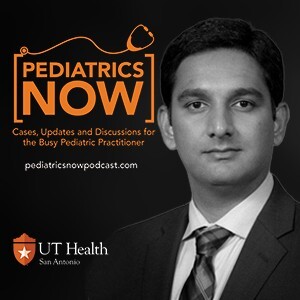
Wednesday Jun 11, 2025
Wednesday Jun 11, 2025
Link for CME credit :
https://cmetracker.net/UTHSCSA/Publisher?page=pubOpen#/getCertificate/10098850
In this enlightening episode, a talk by:
Avinash Boddapati, M.D. Child and Adolescent Psychiatrist | Assistant Professor of Psychiatry
we dive into the intricacies of Autism Spectrum Disorder (ASD) according to the DSM-5, offering clarity on diagnostic criteria and differentiating ASD from other neurodevelopmental and social communication disorders. We explore the prevalence of ASD, its genetic and environmental risk factors, and dispel common myths, such as the debunked link between vaccines and autism.
Discover the unique challenges individuals with ASD face in social communication, restrictive behaviors, and sensory sensitivities, accompanied by an examination of common comorbidities. The episode further addresses the significance of early diagnosis and intervention, discussing various screening tools and the benefits of catching ASD early on.
We also outline an array of therapeutic approaches—from behavioral therapies like Applied Behavior Analysis (ABA) to pharmacological interventions for managing symptoms. Plus, engage with real-life case studies to illustrate ASD's diverse manifestations and the potential for tailored interventions.
Join us as we untangle the complexities of ASD, fostering a better understanding of the spectrum and encouraging effective support strategies for individuals and their families.
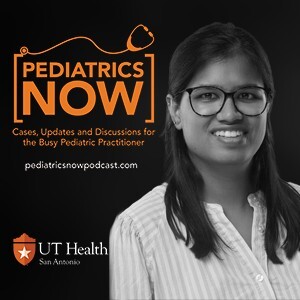
Saturday Jun 07, 2025
Saturday Jun 07, 2025
Here’s the link for CME credit!
https://cmetracker.net/UTHSCSA/Publisher?page=pubOpen#/getCertificate/10098810
Host Holly Wayment brings us a grand rounds episode with
Radhika B. Pillai, MD
as she delves into the importance of bone health in children. With a strong foundation in cystic fibrosis research, Dr. Pillai explores critical pediatric concerns such as calcium growth, puberty disorders, diabetes, and obesity.
In this episode, Dr. Pillai emphasizes the significance of bone health, highlighting its often-under appreciated role in pediatric care. She provides insights into the assessment and diagnosis of bone disorders, focusing on gathering comprehensive medical histories, conducting thorough examinations, and exploring the impacts of nutritional deficiencies.
Through an engaging clinical case study, Dr. Pillai discusses diagnostic techniques, imaging methods, and laboratory tests vital for identifying conditions like vitamin D deficiency rickets. Her expertise illuminates the complex interplay of calcium and phosphate homeostasis, offering valuable perspectives on effective treatment strategies and the importance of early identification.
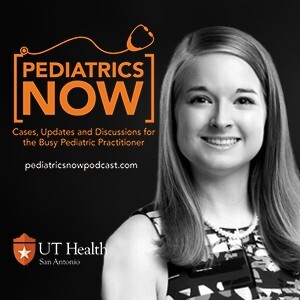
Friday May 30, 2025
Friday May 30, 2025
Link for CME Credit coming soon!
Join host Holly Wayment for a grand rounds talk from Dr. Kang, a pediatrician and neonatal perinatal medicine fellow, as she delves into the world of alternative birth practices. This episode covers a range of topics including water immersion for labor, vaginal seeding, and umbilical non-severance, illustrating the growing interest in these methods. Dr. Kang provides an overview of the benefits and risks associated with each practice, offering insights into their prevalence and the existing medical recommendations.
Understand the reasons behind the increasing popularity of these practices and their implications. This episode provides a valuable perspective on contemporary birthing trends and highlights the importance of well-informed guidance for families exploring these options.
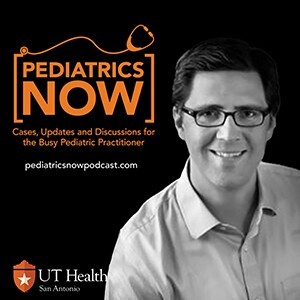
Friday May 23, 2025
Friday May 23, 2025
Link for CME Credit:
https://uthscsa.edu/medicine/education/cme/pediatrics-now-podcastIn this episode of Pediatrics Now, Dr. David Roberts, an Associate Professor of Psychiatry at UT Health San Antonio, returns to discuss with host Holly Wayment the impactful communication technique known as motivational interviewing. With a particular focus on engaging pediatricians and families, Dr. Roberts illustrates how this approach can facilitate open, trusting dialogues around challenging topics like vaccination and behavioral issues in children. He shares practical insights on fostering autonomy and understanding ambivalence in both parents and younger patients, ultimately aiming to support healthier choices through empathetic and skillful conversation. Join us to explore how motivational interviewing can transform interactions in pediatric practice.
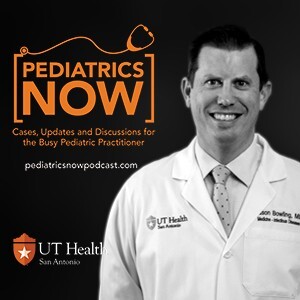
Friday May 16, 2025
Friday May 16, 2025
link for free CME credit coming soonJoin host Holly Wayment as she delves into the pressing issue of measles in Texas with Dr. Jason Bowling, a leading expert in infectious diseases. Dr. Bowling discusses where we are right now with measles, a disease that was previously declared eradicated due to vaccination, the impact on the community, and the critical role of vaccination in preventing further spread.
Learn measles symptoms can mimic other viral infections, and the steps pediatricians can take to accurately diagnose and manage suspected cases. Dr. Bowling also shares insights on the importance of maintaining high vaccination rates to create a "firewall", highlighting the challenges of vaccination hesitancy and the measures needed to counter it.
This episode is an essential listen for busy pediatric practitioners in Texas, around the globe, and elsewhere in the US as they navigate the complexities of a measles resurgence. This episode includes advice about measles testing and isolation protocol.

Thursday May 08, 2025
Thursday May 08, 2025
https://cmetracker.net/UTHSCSA/Publisher?page=pubOpen#/getCertificate/10098690
In this episode, host and executive producer Holly Wayment dives into motivational interviewing (MI) with expert David Roberts, Ph.D.. Discover how this gold-standard counseling approach can dramatically improve treatment adherence for pediatric practitioners. Dr. Roberts, a seasoned psychiatrist and member of the Motivational Interviewing Network of Trainers, shares his extensive experience in training over 3,000 healthcare professionals in MI. Roberts has a new, more flexible way for busy practitioners to learn MI.
www.reflectivetraining.org
Learn how to implement motivational interviewing in busy practice settings. With insights from real-world cases, this episode is a must-listen for practitioners eager to enhance patient engagement and foster behavioral change.
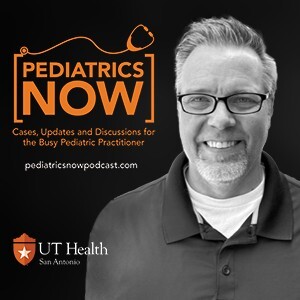
Wednesday Apr 30, 2025
Wednesday Apr 30, 2025
Link for Free CME Credit:
https://cmetracker.net/UTHSCSA/Publisher?page=pubOpen#/getCertificate/10098672
In this episode of Pediatrics Now, host Holly Wayment engages in a conversation with Matthew Anderson, Vice President of Customer Service at PayPal and Venmo. Together, they explore the transformative lessons that pediatric practitioners can learn from customer service practices in the corporate world. Discover how fostering professionalism and empathy among medical teams enhances patient relationships, and learn practical strategies for addressing sensitive topics such as financial discussions with grace. Anderson shares valuable insights on improving customer service in pediatrics, underscoring the power of incremental changes, relationship building, and transparent communication. Tune in for a thought-provoking discussion on creating a more patient-centered and harmonious pediatric practice.

Thursday Apr 24, 2025
Thursday Apr 24, 2025
Link for CME Credit
https://cmetracker.net/UTHSCSA/Publisher?page=pubOpen#/getCertificate/10098640
Join host Holly Wayment on Pediatrics Now as she explores the intersection of medicine and customer service with Matthew Anderson, Vice President of Customer Service for PayPal and Venmo. Discover how principles from the corporate world can enhance patient care and communication in pediatric settings. Learn the significance of humanizing interactions and the critical components that can transform transactional activities into meaningful relationships. Matthew shares personal experiences and practical advice that empower practitioners and their medical teams. Tune in and gain insights to revolutionize patient engagement and satisfaction.
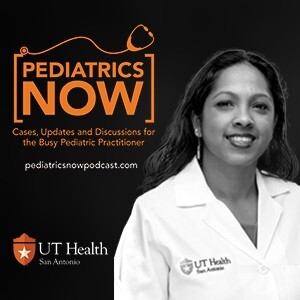
Friday Apr 18, 2025
Friday Apr 18, 2025
Link for MOC Credit
https://cmetracker.net/UTHSCSA/Publisher?page=pubOpen#/getCertificate/10098633
Host and Executive Producer Holly Wayment brings us this insightful child abuse talk by Dr. Natalie Kissoon, as she shares crucial insights into recognizing child abuse in pediatric care. This episode dives deep into case-based discussions, focusing on common signs of abuse such as unexplained bruises, sentinel injuries, and abusive head trauma. Dr. Kissoon emphasizes the importance of a thorough medical evaluation and offers practical guidance for identifying hidden patterns of maltreatment.
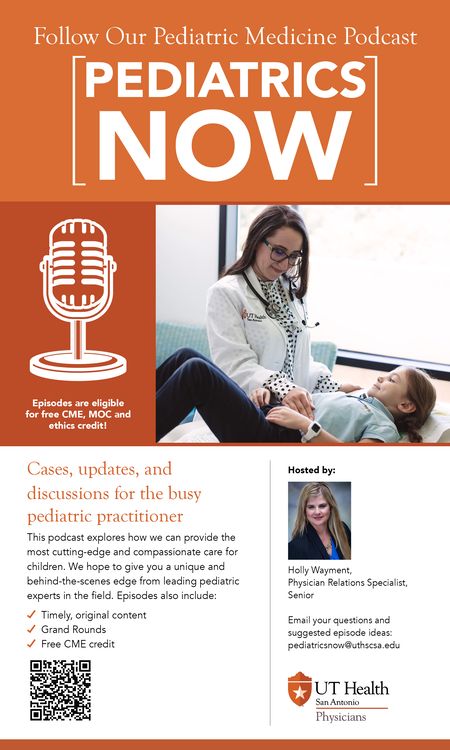
Host and Author Holly Wayment talks to experts about timely topics for pediatric practitioners for free credit that can include CME, MOC and ethics credit. Topics include compassion, up-to-date treatments, how to connect with patients and how to fight burnout plus have more empathy.









